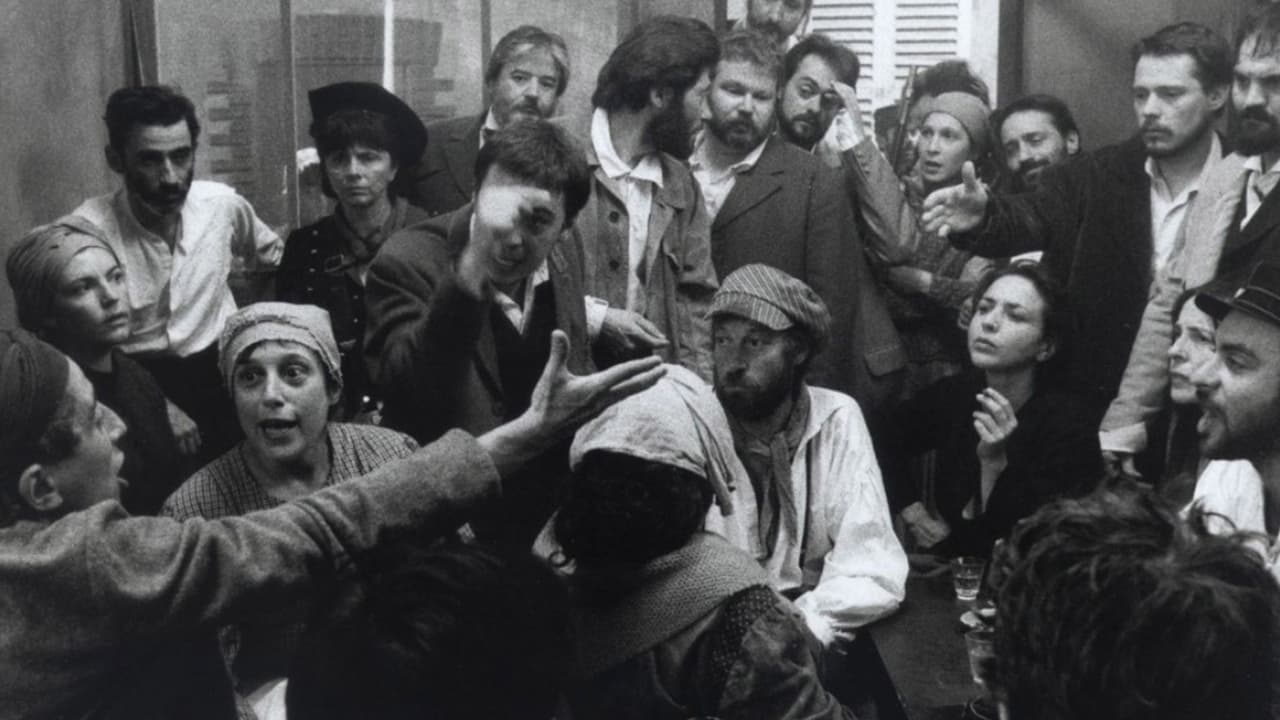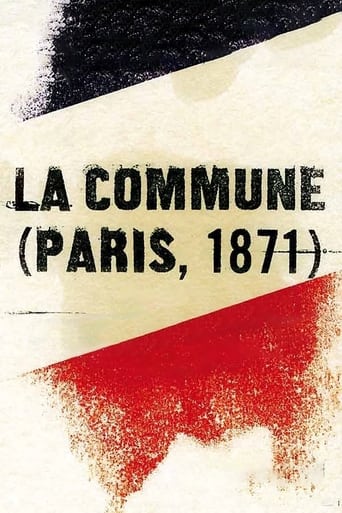Sindre Kaspersen
English screenwriter, film editor and director Peter Watkins' documentary drama which he co-wrote with screenwriter and researcher Agathe Bluysen, is inspired by real events which took place in the capital city of France during two months in the early 1870s. It premiered on German television, was shot on a set at a factory in France and is a French production which was produced by producer Paul Saadoun. It tells the story about the many citizens of the Third French Republic (1870-1940) and how the history of their nation and Europe was changed during the course of sixty-five days of political revolt by a federation of elected delegates called the National Guard and working class civilians who were dedicated to defend their country and colony from a monarchist restoration and a Prussian invasion by the first Chancellor of Germany Otto von Bismarck (1815-1898), and create an egalitarian social republic. Distinctly and engagingly directed by English auteur filmmaker Peter Watkins, this finely paced reconstruction which is narrated by the director in written words, by two television journalists for Commune TV named Blance Capellier and Gerard Bourlet and interchangeably from multiple viewpoints, draws an informative and interactive portrayal of political philosophy. While notable for its atmospheric milieu depictions, reverent cinematography by cinematographer Odd-Geir Sæther and costume design by costume designer Eloide Delaux, this dialog-driven and narrative-driven story where themes like communalism, authoritarianism, radicalization and management of political power are exemplified and debated, is a collective study of an historical period in French history which explains hierarchical and other methods used in audiovisual media and other educational systems like religious or state education whilst using a singular process of filmmaking where the many participants who had to adapt to the production democratically and not merely examine and represent their characters but also express their own views on them, the central theme and the making of the film, goes beyond acting with their personal commitment. This increasingly reflective, densely biographical and extrovert narrative feature from the early 2000s which is set mostly in Paris and in Versailles, France in the late 19th century seventy-three years before women obtained the right to vote in France, and after the fall of emperor Napoleon Bonaparte III (1769-1821), the Second French Empire (1852-1870) and the Franco-Prussian War (1870-1871), and where the fictitious place coined by a 16th century English Roman Catholic which centuries later became a reality due to human beings is reenacted, is impelled and reinforced by its cogently fragmented narrative structure, subtle character development, rhythmic continuity, use of photographs, introduction to historical people like a French school teacher known as the red virgin of Montmartre who used the pseudonym Clémence and parallels between the political climate of the 19th and 20th century. A reclaiming, ideologically ingrained and justified homage to French children, women and men.
tedg
This is a pretty exhilarating idea. Take a period in history where its all about collective points of view. In other words, select a time where the movies chosen by groups clash. Its better if it a time before movies and in a place that believes they know something about movies.Introduce it as a movie, with interviews first with actors and then with characters. Then, action (with characters glancing at the camera), but wait.Soon we see that inside the movie, we will see reporting by a TeeVee news crew. This is displayed in two forms within the film.. We see the news broadcast and the Parisans watching it.They are of course biased in favor of the royalist government. So just as the rabble revolt against the government, we have an alternative TeeVee crew enlisted, who also go around interviewing the crowd as well, all obviously amateur actors, not starving, not sick, toothless and in pain.We are introduced to characters who introduce themselves as fictional characters. We see the two TeeVee reporters take on the character of the events we see, and get blamed for the whole thing, history writing itself. It is the only example I know of this particular type of fold, where our notion of history as retrospective watching is folded into on-screen watchers.But at so many hours, its a long slog because there is some conflating of French history with French film history, and its just not as profound as they suppose.Ted's Evaluation -- 2 of 3: Has some interesting elements.
DrMMGilchrist
****Spoilers only if you don't know 19C history.**** I saw this DVD advertised online, and bought in the shops in France this summer. It was worth the search. At over 5 and a half hours, it is of epic length, but the intimacy of the drama and the exhilaration of its debates make it an inspiring and involving experience. Simultaneously uplifting and heart-breaking, it brings to life one of the greatest stories of 19C which (thankfully) Hollywood has never touched: the 10 weeks of the Paris Commune which ended in the 'Semaine Sanglante', in which 20-30,000 Parisians were slaughtered by Thiers' Versailles government.Peter Watkins is one of British TV's 'originals', famous in the 1960s for his time-bending approach to historical subjects such as 'Culloden', with modern-day reporters interviewing the characters in the field. Controversy over 'The War Game' led to a permanent rift with the BBC and over 30 years working abroad. 'La Commune: Paris 1871' harks back to the dramatised-documentary style of 'Culloden', but is more sophisticated in form and more appealing in subject ('Culloden' was more about Vietnam than 18C Scotland). It engages with contemporary debates on global capitalism, the media, and social activism versus consumerist passivity. It's a true ensemble-piece: the actors, mostly non-professionals (including present-day 'misérables': the unemployed and asylum-seekers), combine scripted work with improvisation: the debates are real. We are led into the story by our main narrators, who address us as themselves - Gérard Watkins and Aurèlia Petit - then in character as Communard reporters Gérard Bourlet and Blanche Capellier. Peter Watkins uses the deliberately anachronistic device of having TV stations from both sides - the Commune and Versailles - covering the events, with their reporters interviewing participants in the conflict. Helped by a journalist from the satirical magazine 'Père Duchêne', Joachim Rivière (Joachim Gatti), Blanche and Gérard guide us around the 11th Arrondissement. The Versailles station, National TV, relies on interviews with pundits (including Bonapartist historian François Foucart as himself), and an attempt at undercover reporting which endangers their hapless young journalist when the crowd rumbles his disguise and thinks he's a spy! Most of the characters are not great names of history, but ordinary citizens of Rue Popincourt, pupils of a convent-school in Rue Oberkampf, artisans, National Guard, a pawnbroker, bourgeois, clergy, soldiers, and Algerians bearing news of colonial suppression in their homeland. Unlike many historical films, 'La Commune' emphasises women's aspirations *without* anachronism, given the real-life importance of the Women's Union, Louise Michel and Elizaveta Dmitr'eva, & c. We meet Françoise Boidard (Armelle Hounkanrin) and Marie-Louise Beauger (Véronique Couzon), two young teachers who want to give girls a proper education, not the needlework, prayers and passive obedience taught by the nuns. The seamstresses, washerwomen and gunsmiths want greater control over their working lives, so form co-operatives. At the town hall, the Women's Union struggles to secure a meeting-room: many of the male Communards still have a lot to learn about female emancipation! The local Women's Union organiser is a dynamic character, vividly realised. Of the actors in identified historical rôles, Catherine Humbert is excellent as Marguerite Lachaise, the 66th Battalion's jauntily uniformed cantinière, as are the men playing Augustin Verdure and the sculptor/subcommittee delegate Charles Capellaro (rather more dashing than his historical original!). But we also see dangerous problems within the Commune: the tensions between centralisation and grass-roots democracy, authoritarianism and egalitarianism, Jacobinism and socialism. The spectre of the Committee of Public Safety is resurrected. Some Communards turn on the reporters for daring to be critical; press censorship is re-introduced, despite protests. As in Spain in the 1930s, a noble cause, under external threat, stumbles over internal disputes. The government's massacres are answered by the Commune's execution of hostages, including the Archbishop of Paris. But the Versailles response is hideously disproportionate: 'total expiation', including killing the wounded in hospital. As the army slaughters its way through the city, the government of the Commune retreats to the Mairie of the 11th Arrondissement. The people we know are now on the front line, from Françoise and Marie-Louise's little schoolgirls to the aged Jules Thibaudier. Thanks to the long running-time, and lengthy on-screen discussions, we have learned to care for them through sharing their struggles for empowerment. To see them risking death on the barricades or by firing squad is heart-breaking. Aesthetically, the film succeeds by understatement. The warehouse-bound set conjures a claustrophobic atmosphere of narrow streets, of siege and barricade. The stark black and white photography is reminiscent of 19C photographs: freeze-frame some of the characters, and you could be looking at cartes-de-visite of the era. Although groups of characters sing to raise morale or celebrate: 'La Marseillaise', 'La Carmagnole', 'Le Chant des Ouvriers', and a ferocious war-chant of 'Ça ira', there is no constant musical soundtrack to manipulate the emotions à la Hollywood. The simple staging and shooting, the use of monochrome and the lack of gruesome special effects are the antithesis of modern blockbusters, yet the climax of 'La Commune' - true and tragic - is a more powerful and moving piece of epic heroism than the Battle of Helm's Deep in 'The Two Towers' (I say this as a fan of Jackson's Tolkien trilogy). I also recommend this film to admirers of Hugo's unabridged novel 'Les Misérables': the next generation's story?Stepping out of character, the actors relate the issues of the Commune to contemporary society: "Fight with us for Utopias: there are still some left to defend!" "...Today it's up to each person to be his/her own barricade!" When Jean-Baptiste Clément's 'Le Temps des Cerises' begins over the credits, I found myself singing along, despite lump-in-the-throat. In this cynical age, the vibrant optimism and courage of 1871 are vital: it's heartening to know that many of the participants have formed 'Le Rebond pour la Commune', to aid in the film's distribution and to carry forward its vision.

